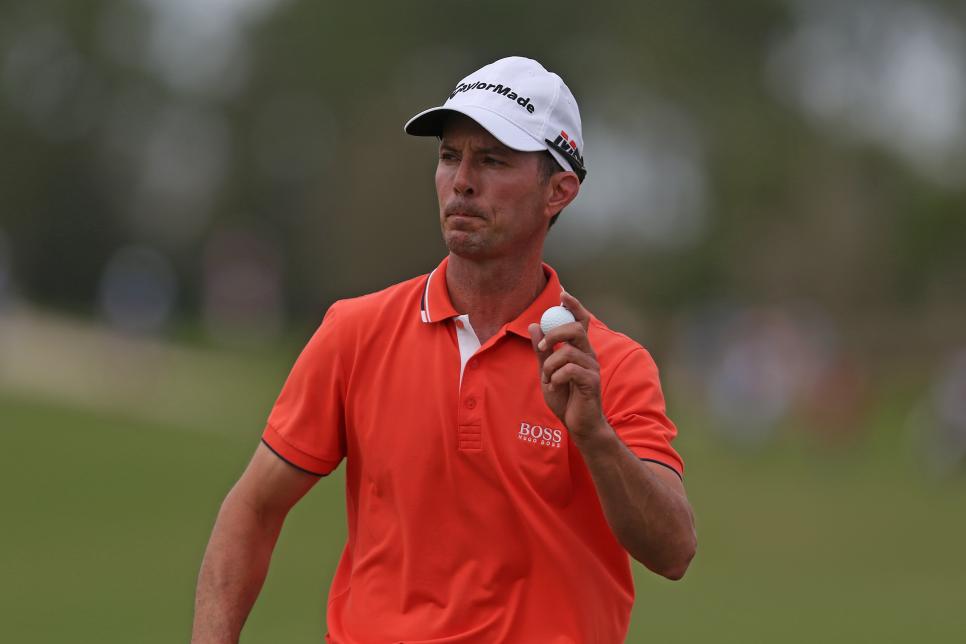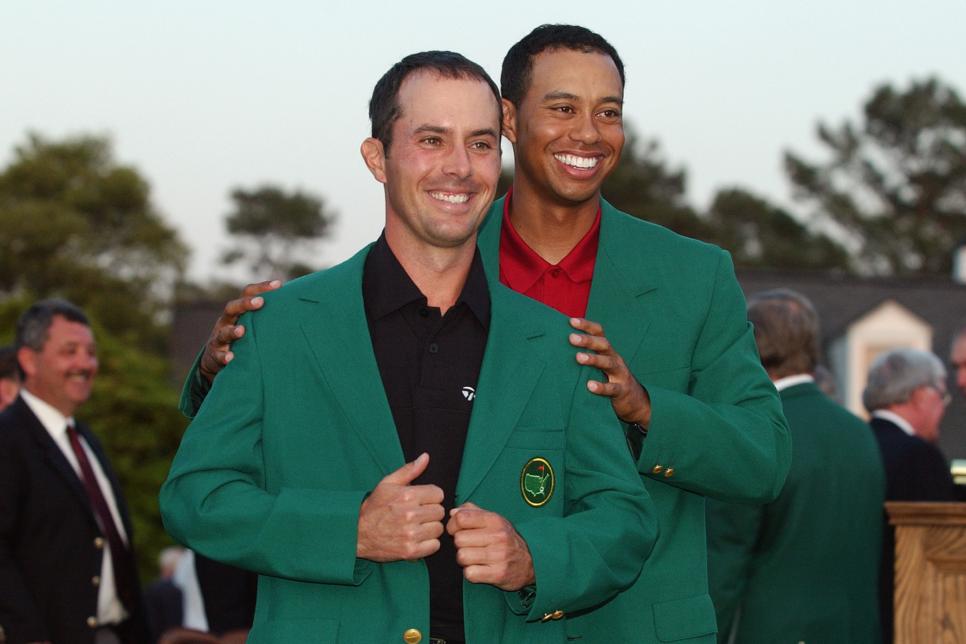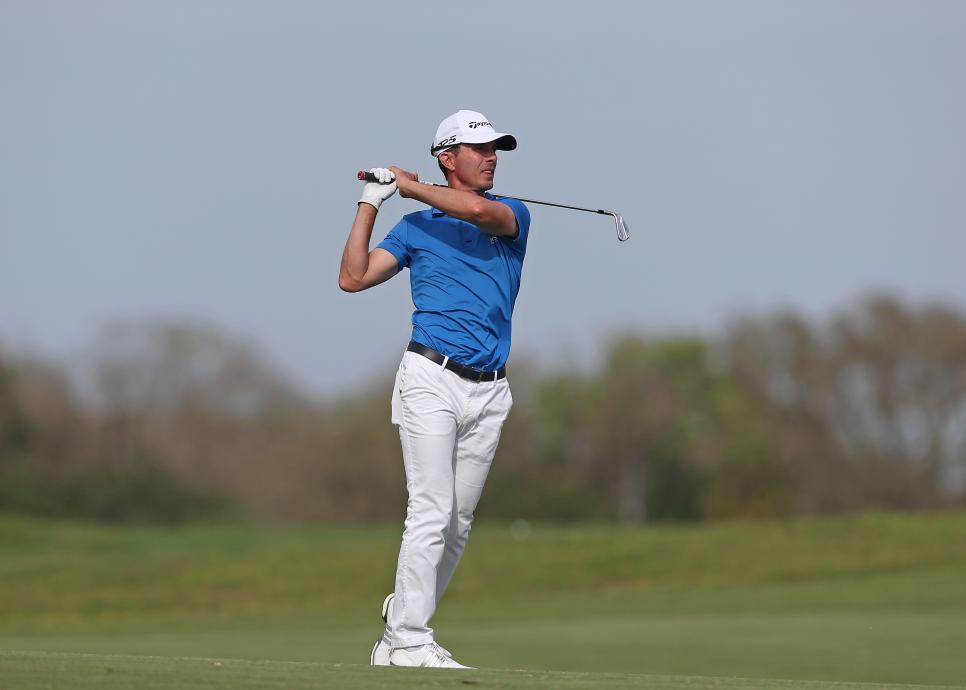
Mike Weir knows the question is coming. It's loaded in the chamber, waiting, begging to be unholstered. Even as it’s not initially asked, it hovers over the conversation, because it doesn’t take a clairvoyant to foresee the ask will, eventually, be coming.
There are many layers to probe in the Canadian’s past, from his improbable success to his quick vanishment. But now, in the present, only one question comes to mind, and Mike knows it too:
Why is a Masters champion playing on the Web.com Tour?
• • •
The query arose two weeks ago when Weir’s name popped up on the Panama Championship leader board, fueled by a first-round 66. You’re excused if you did a double-take at the sighting, or believed this was a case of mistaken identity, that another Mike Weir was working his way up the ranks.
After all, the Mike Weir made a total of 10 starts on the PGA Tour since 2015, making the cut on only one occasion. He hadn’t reached the tour’s postseason in a decade. He’s 48 years old, 49 in May, double the typical age for a player on the development circuit.
Besides, the man has a green jacket in his closet. Major champs don’t do minor leagues.
Except there it was again, “WEIR,” among the leaders at last week’s LECOM Suncoast Classic with opening scores of 66 and 68. His final standing was hurt by a stumble on Sunday, but the matter could no longer be chalked up as an aberration.
So, what gives?
On the semantics front, it’s simple: The Web.com Tour has an exemption that offers status to past PGA Tour members aged 48-49. An exemption Weir plans to utilize, hoping for 20 or so starts this campaign.
As to why ... well, as mentioned above, it’s a question Weir expects and has pondered. Spending a decade on the sport’s outskirts presents plenty of time for that. So when he responds, there’s no doubt it emanates from somewhere deep.
“I’m still motivated,” Weir told Golf Digest on Tuesday. “I love to compete. I love the game. You know it’s just … I’m happy to be able to play, I’m happy to be working on my game. You can stand on the range all you want, but you have to get out there and play.
“I’m not 25, I might not be able to do what I used to do. But I still love it."

Harry How
That reads like a veteran platitude; know it was not in delivery. Throughout the conversation, Weir’s voice skipped with effervescence, an inflection reminiscent of a rookie in humble awe of his surroundings. To be fair, Weir had just left Augusta National after a two-day visit—what soul wouldn’t feel renewed—but Weir’s buoyancy is fueled by more than the mystique of the Georgia pines.
He has battled injuries since 2011, wrist and elbow ailments zapping the vitality at the tail of his prime. Just three years ago, his body was so wrecked he was forced to take leave of absence. There were moments he didn’t think he would play again, on any level.
“I haven’t played a full schedule in a number of years, or even had a schedule, really,” Weir said after the Suncoast. “The last couple of years it’s always been like, ‘I wonder if I’ll get in next week.’ It’s hard to prepare that way. It’s hard to be at home for a month and wonder when you’re going to play next.”
Given his sabbatical, it’s a statement not particularly staggering. Weir's star has long past dimmed. It does, however, belie the stature Weir once held.
Though Weir is primarily known for his 2003 Masters triumph—where he shot a final-round 68 and beat Len Mattiace in a playoff to become the first left-handed winner in tournament history—it far from encapsulates his career. Despite not reaching the PGA Tour until 29, he won eight times, including a Tour Championship and WGC Championship. The Masters was his only major victory, but he was a frequent contender at golf's biggest events with 12 top-10s in majors, highlighted by six in a nine-tournament span. He was honored as Canada's Athlete of the Year three times, a frequency topped only by Wayne Gretzky and Ferguson Jenkins. Weir played in five Presidents Cups, and once defeated Tiger Woods in an epic 2007 Sunday's singles match in front of his countrymen at Royal Montreal Golf Club.
In short, a player of such prestige should not be in a place like this, where young guns and journeymen aspire to accomplish a tenth of what Weir has.
But if his pride was shattered by his surroundings, Weir's not letting on. Quite the opposite.
“It's refreshing for me, in a good way,” Weir asserts. “I was in a lot of these guys shoes you know 20, 25 years ago when I was coming out of college and turning pro. It's great to see the young guys that are out there and watch them and compete against them.”
Teeing it up again has been a rejuvenation, yes, but so too has the communal ambience of the tour. It speaks to Weir, after being on the outside for so long, citing it as a catalyst to his play. In turn, he has tried to reciprocate. Make no mistake, Weir wants to beat them—has to, if he wants to go where he wants to go—yet he has been something of a mentor to a host of players, doing what he can to catapult these fledgling talents.
“Guys come up and ask me questions about how to make it, what to do out of the bunker … just gave a lesson on chip shots last week,” Weir said. “I want them to play well, and I want them to see their dreams fulfilled.”
As for Weir’s dreams?

Matt Sullivan
This foray is more than keeping the competitive fires lit.
He wants to make that clear, and does so multiple times. The PGA Tour Champions may beckon, but the sole ambition through the windshield is a return to the PGA Tour.
Weir concedes though, even if he sustains the flashes from the past few weeks, it's not an easy road back for any player, and Father Time hasn’t alleviated those concerns. Save for Phil Mickelson and his dark magic, Weir’s age is a purgatory for golfers. He’s not old enough for the senior circuit, but more and more PGA Tour events are awarding sponsor’s exemptions to up-and-comers. Complicating things is a changing landscape. Power is no longer an asset on tour; it’s a prerequisite. One that hampers the 40-and-older crowd’s capability to hang with their younger professional brethren.
“The power advantage is more pronounced at this stage of the evolution of golf,” said Weir, who was never mistaken for a long hitter. “That’s a huge factor. Just the way the golf courses are set up now reward that more. There used to be more premium on accuracy. It’s just the way it is.”
In that same breath, there’s no sense of sour grapes, or surrender, from Weir. He insists there remains a place in golf for strategy and ball-striking and a lights-out short game. His recent performances in Panama and Lakewood Ranch prove it can be done.
Weir states he’s in the acclimation phase with his game and his body. He’s finally healthy, just not seasoned to playing this much, his strong Web starts extinguished on the weekend by sloppy, perhaps gassed, play.
“Just getting in that tournament rhythm again,” Weir said. “It's about managing my time, managing practice.”
Not that he's complaining. There's joy in the process, especially when you haven't worked in seemingly forever. “There's nothing like the flow of playing tournament golf,” Weir said. “You take the good things on to the next week and learn from maybe the not so good things. And move forward.”
Which is where Weir is focused, refusing to dwell on what was. All that matters is he’s here, finally, playing golf again.
“Playing three weeks? Man, I hadn’t done that in a few years,” Weir says with cheery wonder.
Why is a Masters champion playing on the Web.com Tour? As Weir counters, why not?